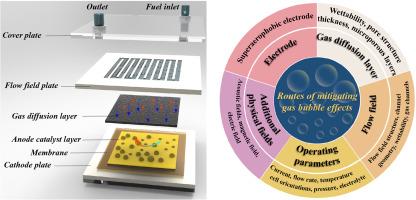Gas bubbles in direct liquid fuel cells: Fundamentals, impacts, and mitigation strategies
IF 16.3
1区 工程技术
Q1 ENERGY & FUELS
引用次数: 0
Abstract
The pursuit of carbon neutrality underscores the paramount significance of advancing high-performance direct liquid fuel cells. While several strategies have been established to enhance power generation and stability, including the adoption of new membrane materials, efficient electrocatalysts, innovative cell structures, and alternative reactants, the presence of gas bubbles on the anode remains a significant factor affecting mass transfer and energy efficiency. This review seeks to offer a thorough comprehension of the ramifications of gas bubbles on the cell performance. To achieve this, this review begin by offering an overview of the fundamentals of gas bubble behavior. Subsequently, a detailed analysis of the various ways in which gas bubbles impact fuel cells is presented, encompassing activation losses, ohmic losses, concentration losses, pressure drop, and cell stability. Furthermore, strategies for mitigating the adverse effects of gas bubbles are detailed, encompassing electrode designs, gas diffusion layer designs, anode flow field designs, control of operating parameters, and the application of additional physical fields. Finally, potential avenues for future research in the realm of direct liquid fuel cell applications are outlined, highlighting the ongoing efforts to advance this technology and its role in achieving carbon neutrality.

直接液体燃料电池中的气泡:基本原理、影响和缓解策略
追求碳中和强调了推进高性能直接液体燃料电池的重要意义。虽然已经制定了多种策略来提高发电量和稳定性,包括采用新型膜材料、高效电催化剂、创新电池结构和替代反应物,但阳极上气泡的存在仍然是影响传质和能效的一个重要因素。本综述旨在全面了解气泡对电池性能的影响。为此,本综述首先概述了气泡行为的基本原理。随后,详细分析了气泡影响燃料电池的各种方式,包括活化损失、欧姆损失、浓度损失、压降和电池稳定性。此外,还详细介绍了减轻气泡不利影响的策略,包括电极设计、气体扩散层设计、阳极流场设计、运行参数控制以及附加物理场的应用。最后,概述了直接液体燃料电池应用领域未来研究的潜在途径,强调了为推动这项技术及其在实现碳中和方面的作用所做的不懈努力。
本文章由计算机程序翻译,如有差异,请以英文原文为准。
求助全文
约1分钟内获得全文
求助全文
来源期刊

Renewable and Sustainable Energy Reviews
工程技术-能源与燃料
CiteScore
31.20
自引率
5.70%
发文量
1055
审稿时长
62 days
期刊介绍:
The mission of Renewable and Sustainable Energy Reviews is to disseminate the most compelling and pertinent critical insights in renewable and sustainable energy, fostering collaboration among the research community, private sector, and policy and decision makers. The journal aims to exchange challenges, solutions, innovative concepts, and technologies, contributing to sustainable development, the transition to a low-carbon future, and the attainment of emissions targets outlined by the United Nations Framework Convention on Climate Change.
Renewable and Sustainable Energy Reviews publishes a diverse range of content, including review papers, original research, case studies, and analyses of new technologies, all featuring a substantial review component such as critique, comparison, or analysis. Introducing a distinctive paper type, Expert Insights, the journal presents commissioned mini-reviews authored by field leaders, addressing topics of significant interest. Case studies undergo consideration only if they showcase the work's applicability to other regions or contribute valuable insights to the broader field of renewable and sustainable energy. Notably, a bibliographic or literature review lacking critical analysis is deemed unsuitable for publication.
 求助内容:
求助内容: 应助结果提醒方式:
应助结果提醒方式:


